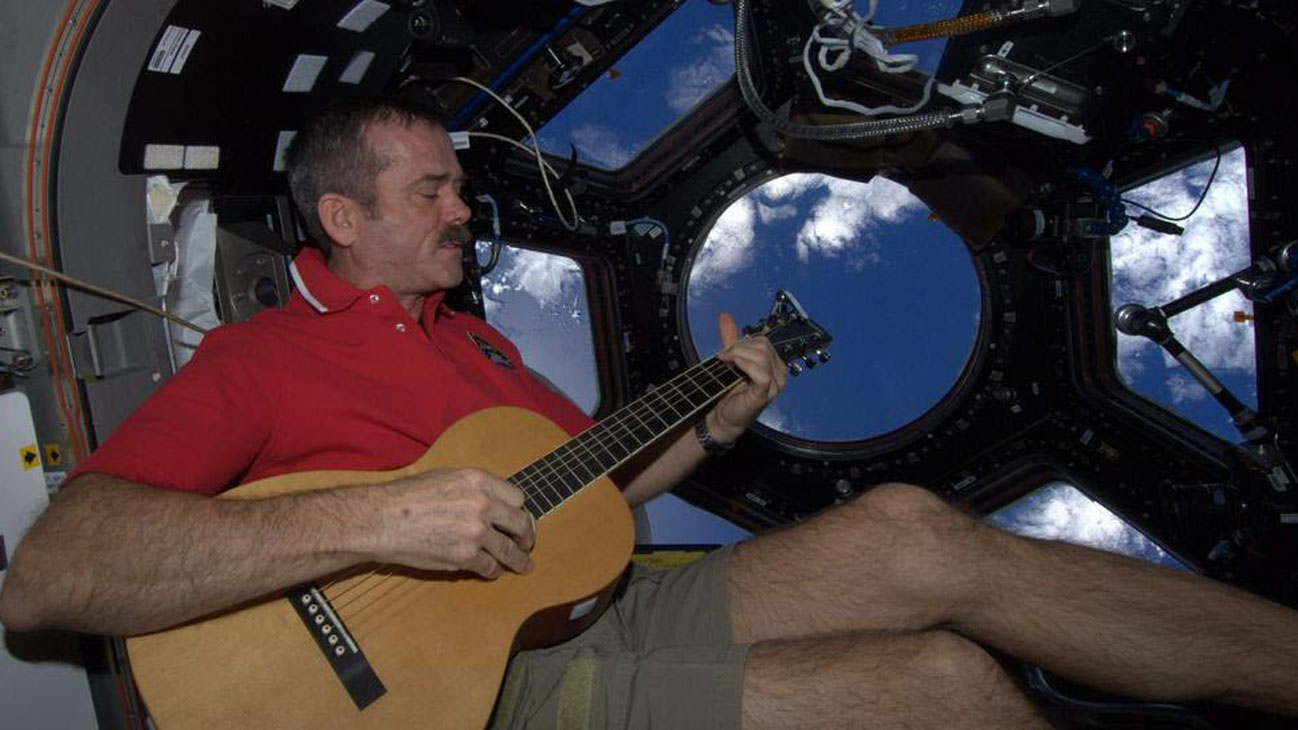“Good morning, Earth!” That is how Colonel Chris Hadfield—writing on Twitter—woke up the world every day while living for five months aboard the International Space Station. Through his 21-years as an astronaut, three spaceflights and 2600 orbits of Earth, Colonel Hadfield has become a worldwide sensation, harnessing the power of social media to make outer space accessible to millions and infusing a sense of wonder into our collective consciousness not felt since humanity first walked on the Moon. Called “the most famous astronaut since Neil Armstrong,” Colonel Hadfield continues to bring the marvels of science and space travel to everyone he encounters. Colonel Hadfield releases his new album, Space Sessions: Songs from a Tin Can, this October, and the Toronto Star caught up with him to discuss the excitement that surrounds it:
Even two months away from launch, Chris Hadfield can claim without a trace of immodesty that his upcoming debut album is out of this world.
“Space Sessions: Songs from a Tin Can” will be released Oct. 9, arriving with the weighty honour of being the first album recorded at least partially off planet.
The 11-song collection — buoyed by the bonus inclusion of his famous David Bowie cover, “Space Oddity” — is not intended to rocket Hadfield to musical stardom. Instead, it’s another step in the retired astronaut’s multimedia mission to translate the joy of space travel to the earthbound public.
“To me, this is a continuation of my best efforts to share the experience, to the best of my ability,” said Hadfield during a telephone interview Thursday, while relaxing at a cottage near Sarnia, Ont.
“I am just as delighted with this as I am with any photograph I took or any other verbal description I’ve ever had of that magnificent experience.”
A veteran of various bands for roughly 25 years, Hadfield decided before his December 2012 mission to the International Space Station that he would like to try to record music while aboard.
He perhaps did not expect that doing so would be, in some ways, an astronomical hassle.
Gravity, or a lack thereof, was the main culprit. To record an early tune, he stuck an iPad on the wall with Velcro and used its ambient microphone to capture the sound.
Eventually, he decided the best place to record was ensconced in his tiny sleep pod, with a microphone plugged into his iPad, floating in front of him. He was thankful to have brought a compact Canadian-made Larrivée Parlor acoustic guitar, because others might not have fit the narrow confines.
Playing that guitar was, however, another matter.
“It’s hard to play guitar on a spaceship, because there’s nothing to hold the guitar stable,” he pointed out. “Almost always, the guitar slips in your hands. If you’re a guitar player, I tell people to try playing while standing on your head.
“The producer who was helping me, Paul Mills, said: ‘Your guitar playing is a little messy,’” he added with a laugh. “I said, yeah, you come up here and play guitar.”
His singing voice mutated too, he explains, because sinuses don’t drain mechanically like they do on Earth.
“There’s no gravity to pull the fluid out of your head,” he said. “So you always have a full head and swollen tongue and vocal cords.”
Still, Hadfield’s space recordings became the bedrock for the songs comprising “Space Session.” Once back on Earth, Hadfield worked on the songs with Juno-winning producer Robbie Lackritz and a cast of professional musicians.
Tasked with describing the record’s sound, he reels off a list of mostly Canadian influences: Gordon Lightfoot, Leonard Cohen, Ian and Sylvia, Great Big Sea and the Kingston Trio.
Hadfield brought some of the songs with him from Earth and finished them in orbit, while others were written completely in space. He collaborated extensively with his brother Dave, and co-wrote “Beyond the Terra” with his son, Evan.
Of course, his atmosphere provided ample inspiration.
“Window of My Mind” was written after Hadfield crossed the sprawling width of Canada in mere minutes, while “Space Lullaby” found Hadfield seeking connection with his three kids.
Asked about “Feet Up,” meanwhile, Hadfield recalls the rigours of liftoff and his first true instance of weightlessness.
After 166 days in space, the sensation didn’t get old. Hadfield calls the feeling a “magic trick that never ends.”
He listened to “Feet Up” recently and in some small way it might have brought him back.
“It just brings a smile to my face,” he said. “Everything that this music means to me, how it was created and what it means for my life.
“For me, it was a lovely part of the entire experience.”

